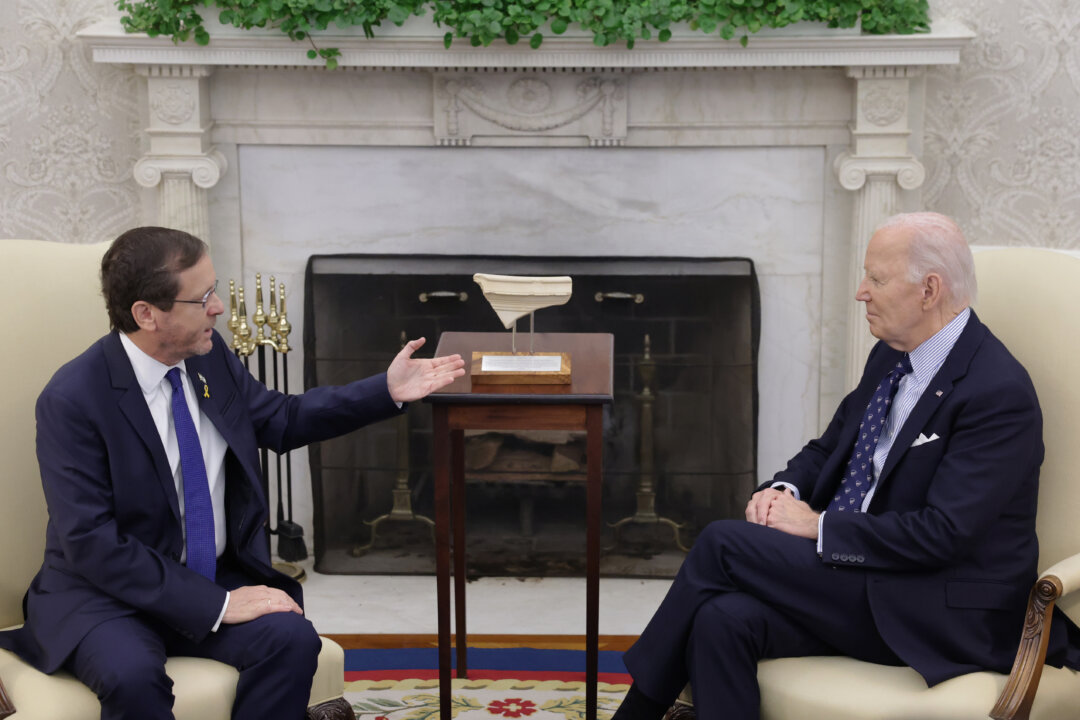Herzog also spoke with Trump and reiterated the urgent need to bring hostages back home.
WASHINGTON—President Joe Biden hosted Israeli President Isaac Herzog at the White House on Tuesday to discuss the ongoing crises in Gaza and Lebanon.
Before their meeting, Biden reaffirmed that his commitment to Israel is “ironclad.”
Herzog expressed gratitude to Biden, calling him “a friend.”
The Israeli president began his remarks by sharing the “sad news of the day,” announcing that two Israelis had been killed on Nov. 12 by rocket attacks from Lebanon in the northern town of Nahariya.
Both leaders agreed on the urgent need to bring the hostages home. Herzog linked the hostage crisis directly to Iran, stating: “It all starts in Tehran. It all starts in the empire of evil.”
He went on to say that Iran is working to destabilize the region and is pursuing nuclear weapons.
“Mr. President, this has to be a major objective all throughout your term and the next term of the next president, because we have to make sure that they cannot fulfill their evil intentions,” Herzog told Biden.
The two leaders met at the White House in July 2023, and again in Tel Aviv following the Oct. 7, 2023, attacks.
Vice President Kamala Harris didn’t join the meeting.
On Monday evening, Herzog attended an event in Washington with Jewish community leaders from across the United States.
During his speech at the event, Herzog congratulated President-elect Donald Trump for his election victory, calling him “a champion of peace and cooperation and a great friend of Israel.”
“In our conversation just a few days ago, following his election, we spoke of the urgent need to bring our hostages back home. President Trump reiterated his love for Israel,” Herzog said.
On Nov. 12, Trump announced that Mike Huckabee, the former governor of Arkansas, would be appointed as the U.S. ambassador to Israel.Biden announced in May that the various parties had agreed to a phased framework for a permanent cease-fire, whereby the Hamas terrorist group would gradually release about 100 hostages in exchange for increased flows of humanitarian aid to the embattled Gaza Strip. The deal would have eventually concluded with the end of the fighting in Gaza and the release of the last hostages.
Talks on that cease-fire framework stalled by August.
Last month, Egypt proposed a temporary cease-fire in hopes of jump-starting efforts for a more permanent solution. Thus far, no deal has materialized.
Recently, the Qatari government has paused its involvement in mediating talks to reach a cease-fire in the ongoing Israel–Hamas war, after ending the latest round of discussions without an agreement.
In a Nov. 9 statement, the Qatari Ministry of Foreign Affairs confirmed that Qatar had suspended its involvement in cease-fire discussions but disputed claims that Qatar had outright withdrawn from the peace process.
Qatar, Egypt, and the United States have been working as intermediaries to bring an end to the fighting in the Gaza Strip and get Hamas to free hostages that it has held there since Oct. 7, 2023.
The White House earlier stated that it is working “diligently” to secure a cease-fire agreement between Israel and Hamas, one of Biden’s primary goals before the end of his term.
Israeli Prime Minister Benjamin Netanyahu said recently that he has spoken to Trump a few times since he won the U.S. election.
“In recent days, I have spoken three times with U.S. President-elect Donald Trump,” he said in a video posted on X on Nov. 10.
“We see eye-to-eye on the Iranian threat in all its aspects, and on the dangers they reflect. We also see the great opportunities facing Israel, in the area of peace and its expansion, and in other areas,” he said.
It’s uncertain how Trump will handle the crisis in the Middle East, particularly if a cease-fire is not achieved before the end of Biden’s term.
Netanyahu enjoyed a close relationship with Trump during his first term as president.
Trump relocated the U.S. Embassy in Israel from Tel Aviv to Jerusalem, recognized Israel’s sovereignty over the Golan Heights, and brokered peace deals between Israel and the United Arab Emirates, Bahrain, Morocco, and Sudan called the Abraham Accords.
Jackson Richman contributed to this report.

